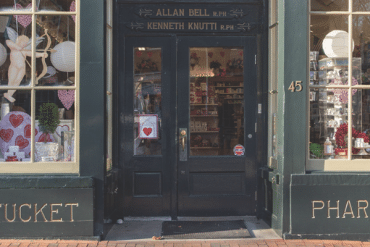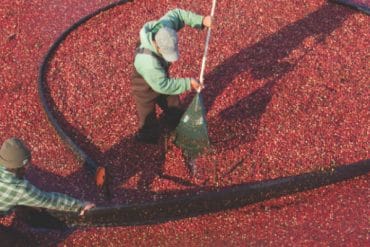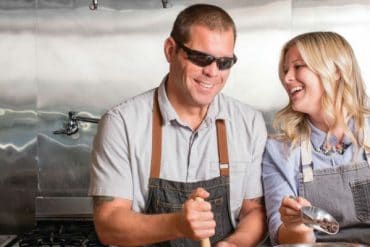 Of all the oenophiles tasting at this year’s Nantucket Wine Festival, one man in particular might just be the most revered. Eric Asimov has served as the Chief Wine Critic at the New York Times for ten years and is the author of How to Love Wine. This spring, Asimov launched “Wine School,” an interactive column on the New York Times website that allows readers to learn about wine from the comfort of their homes. In preparation for this year’s Grand Tasting, we asked the master himself how to get the most out of the Wine Festival experience.
Of all the oenophiles tasting at this year’s Nantucket Wine Festival, one man in particular might just be the most revered. Eric Asimov has served as the Chief Wine Critic at the New York Times for ten years and is the author of How to Love Wine. This spring, Asimov launched “Wine School,” an interactive column on the New York Times website that allows readers to learn about wine from the comfort of their homes. In preparation for this year’s Grand Tasting, we asked the master himself how to get the most out of the Wine Festival experience.
N Magazine: What advice would you give first-timers attending the Nantucket Wine Festival to help them really soak up the experience, while also not getting overwhelmed?
Eric Asimov: The amount of wine available can seem overwhelming, so don’t feel you have to drink everything, particularly at the Grand Tasting. Pick out the producers and regions you are most interested in, and focus on them. Relax, and drink plenty of water.
N Magazine: How do you keep your palate on point after tasting hundreds of wines? I’ve read of at least one wine expert who had his nose insured by Lloyd’s of London for eight million dollars. How do you protect your palate?
Eric Asimov: Ha. Insured? Maybe next time I need a publicity stunt. Tasting dozens of wines at one time is never the best way to understand particular wines, though sometimes it’s a professional necessity. I prefer drinking rather than tasting, and would much rather drink a few bottles with dinner than taste a hundred wines.
N Magazine: You have one of the most revered palates in the country—what’s your ideal meal from soup to nuts?
Eric Asimov: I appreciate very simple dishes, and on Nantucket it’s got to be sea- food, particularly clams, bay scallops and chowder. Fruit for dessert. Good bread. And of course wonderful wines.
N Magazine: You come from a distinguished literary tradition: Your father was the editorial vice president of Newsweek and your uncle was the prolific science fiction writer, Isaac Asimov. Did you grow up always knowing you were going to become a writer?
Eric Asimov: No! Too much to live up to, and yet that’s what I ended up doing, though in a very different way than my uncle.
N Magazine: Was there a particular experience that set you on your course to write about food and wine?
Eric Asimov: As a sullen fourteen-year- old in Paris, I was taken to lunch by my father and some of his friends. That meal, which was so vibrant, the flavors so much fuller and richer and more alive than what I was used to in the land of TV dinners and instant coffee, inspired me to want to repeat that experience again and again.
N Magazine: Wine writers come up with many imaginative ways to describe wine. Are there any descriptors you’re particularly proud of that come to mind?
Eric Asimov: Well, texture is important to me. The better a wine feels in the mouth the more you want to get to the next sip. But I think the extravagant language we associate with wine tasting notes is counter- productive and largely useless. It’s primarily useful as a mnemonic device, reminding individuals of their own tasting experiences. It isn’t useful in communicating the experience of that wine to others.
N Magazine: One of your most famous columns is “$25 and Under.” What advice would you give someone on a budget who still wants to enjoy a high-end culinary experience?
Eric Asimov: I would say, forget about the high-end experience. So many wonderful low-end meals beckon, particularly if you are willing to be adventurous, to explore unfamiliar cuisines and are not overly concerned with creature comforts.
N Magazine: What do you think is the most common mistake wine drinkers make in selecting a wine?
Eric Asimov: I think the most common mistake is fearing that you’re making a mistake. Wine is far more forgiving than we think. Most wines can go with many foods, so there’s really no need, unless you are a professional, to be obsessive about wine-and-food pairings. It’s not a mistake, but the biggest problem is the anxiety many people feel about wine, which leads to fearfulness and worry.
N Magazine: How does one overcome this fear associated with wine?
Eric Asimov: By realizing that wine is a food, a grocery, and all the ridiculousness we’ve attributed to wine is an artificial construct of wine culture. It’s just a drink that can offer great pleasure. It can do much more than that, and can really attain profound heights. But it takes a certain level of commitment to appreciate that, while the pleasure of wine can be enjoyed without that sort of commitment. It all depends how far you want to go. Either way, not to worry.
N Magazine: I know many fine dining chefs who will finish a night of service with a box of pizza and cheap beer. What’s your guilty pleasure?
Eric Asimov: I don’t believe in guilty pleasures. Why should I feel guilty? What’s wrong with pizza and beer? Honestly, I’m too old to feel ashamed of anything I enjoy. When you are younger, your body can tolerate all sorts of over-indulgence so perhaps your conscience has to play a greater role. Now, my body tells me what I should and should not eat and drink, and I try to hear the message.





